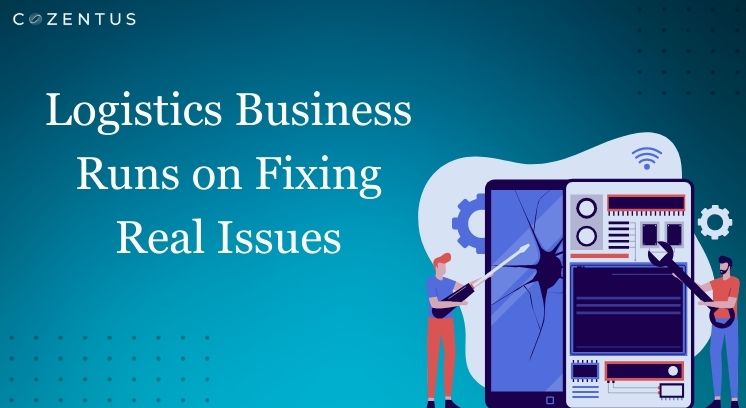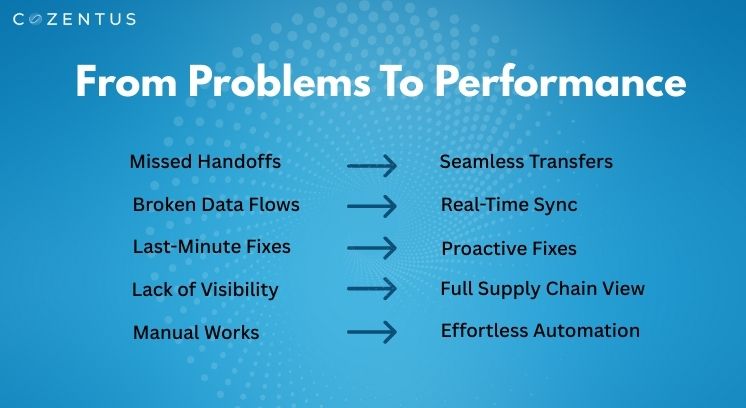Let’s Talk About the Problems You Face Every Day
If you work in logistics or operations, you already know the truth: nobody wakes up in the morning thinking, “I can’t wait to execute on our three-year strategic roadmap today.”
You wake up thinking about the truck that missed its loading window. The shipment is stuck at customs. The customer who’s calling for an update you don’t have. The invoice that doesn’t match the delivery data.
This is the real world.
And yet, too often, you sit through meetings where the conversation is filled with high-gloss decks and visionary language that sounds inspiring - but does nothing to fix the fact that two systems in your network haven’t spoken to each other for days.
At Cozentus, we believe it's time to put the strategy slides aside for a moment and talk about what really matters: your day-to-day operational pain.

Strategy Isn’t the Problem - Disconnection Is
Let’s be clear. Roadmaps and strategy have their place. You need a long-term vision to guide investment and focus. But when the reality on the ground doesn’t match the PowerPoint, frustration builds fast.
In logistics, there’s a gap between what’s drawn on a plan and what happens at 2:13 p.m. on a Tuesday when a handoff fails.
- Your TMS says a shipment is in transit- but your driver reports a two-hour breakdown delay.
- Your warehouse scan data is clean - but the ERP still shows inventory sitting in another city.
- Your AI-powered dashboard says “green” - but your customer is on the phone asking why their order hasn’t arrived.
These aren’t theoretical gaps. They’re business-critical failures that cost time, money, and trust.
Buzzwords Won’t Fix the Problem
We’ve all been in those conversations where the answer to every pain point seems to be a trendy term, like digital twin, blockchain, AI, Automation - without a real plan for integration or impact.
The problem isn’t that these technologies have no value. They do. But they’re not magic.
In our work with logistics companies, we’ve seen big tech promises fall short because:
- The basics weren’t fixed first: Broken data flows don’t get better just because you put them in a blockchain.
- User adoption was ignored: If your team finds a tool clunky or irrelevant, they’ll work around it.
- Integration was underestimated: A “plug-and-play” promise can turn into a 12-month custom-build headache.
Before chasing the next shiny tool, it’s worth asking: “Will this actually solve my Tuesday problem?”
Real Problems That Keep Ops Leaders Up at Night
Here’s what we hear most often when we speak with operations leaders in logistics:
- Missed Handoffs
Information and responsibility move from one team to another, but the process breaks in the middle. The result? Delays, duplication, and customer frustration. - Broken Data Flows
Systems that should be in sync aren’t. Updates in one platform don’t reach the others in time—or at all. This makes accurate decision-making almost impossible. - Last-Minute Fixes
Instead of working proactively, teams spend most of their energy fixing issues after they’ve already disrupted operations. - Lack of Visibility
You can’t manage what you can’t see. Incomplete tracking, outdated status updates, and blind spots in your supply chain cause preventable errors. - Manual Workarounds
Every time a process fails, people create their own fixes. Over time, this leads to inconsistent methods, more errors, and wasted effort.

Why We Need to Speak the Same Language
The reason strategy talk often misses the mark is because it’s too far removed from the lived experience of the people making logistics work.
The planner, the dispatcher, the warehouse lead, the customs broker - they speak in shipments, scans, routes, and delays. They care about today’s customer promises, not next year’s product launch.
When executives and technology partners talk in that same language, change becomes possible. When they don’t, tools become shelfware, processes drift, and trust erodes.
At Cozentus, our first step in any engagement is simple: we sit with your teams, ask about their headaches, and watch the work in motion. Because you can’t fix a flow you’ve never seen.
Solving Real Problems Starts Small
Big transformation programs sound impressive, but the real progress in logistics often comes from fixing small but critical issues first.
- Automate the repeatable so teams stop wasting time on low-value tasks.
- Connect your data sources so every system works from the same truth.
- Build alerts into workflows so problems are flagged before they snowball.
- Simplify user experience so your tools feel like help, not hurdles.
We’ve seen clients cut hours from daily operations just by getting systems to “talk” in real-time, or by eliminating one unnecessary approval loop. These changes don’t make flashy headlines—but they free up people to focus on what actually drives performance.
You Might Like: If It Doesn’t Help You Do Your Job, It’s Just Noise
The Business Case for Fixing the Basics
In logistics, every delay keeps adding. A one-hour hold in one step can become a missed delivery window, which becomes an SLA breach, which becomes a lost client.
When you solve root operational problems, the impact multiplies:
- Faster turnaround → Better capacity utilization
- Cleaner data → More accurate forecasting
- Fewer manual steps → Lower labor costs
- Proactive issue resolution → Stronger customer relationships
These are results you can measure—not just in reports, but in the way your day feels.
From Conversation to Action
Here’s how we keep our focus on reality, not just roadmaps:
- Listen First – We ask your teams about their biggest headaches, not just their long-term ambitions.
- Map Current Reality – We document what’s actually happening—not what the process manual says should happen.
- Target Quick Wins – We fix the most painful, most fixable problems first.
- Scale What Works – Once a small fix delivers value, we expand it.
- Keep It Human – Technology is a tool, not the solution in itself. People and process come first.
A Conversation Senior Leaders Need to Have
If you’re a senior leader in logistics, here’s the hard truth: your operations teams might not tell you how frustrated they are with a tool or process, especially if it’s been “strategically mandated” from above.
That’s why it’s critical to create space for unfiltered feedback. Ask:
“What slows you down the most?”
“What’s the one thing you’d fix tomorrow if you could?”
“Where do you see workarounds happening?”
These questions can surface problems that no quarterly report will ever reveal—and fixing them might give you more ROI than any high-concept transformation initiative.
The Bottom Line
Roadmaps matter. But in logistics, they’re only as good as your ability to keep the wheels turning today.
So, let’s talk about the truck that’s late, the data feed that’s broken, and the approval step that nobody understands but everybody follows. Let’s fix those things.
Because when you solve the real problems, the roadmap starts to make sense, and the people running your operations start to believe in it.
At Cozentus, we speak your language. We know what problems logistics companies face on a daily basis. Hence, we know that the fastest way to fix all your problems with technology and manpower.
Let’s talk and fix your problems one by one.
Recent Post
Subscribe to our newsletter
Stay updated on latest trends and news in the supply chain and logistics industry







